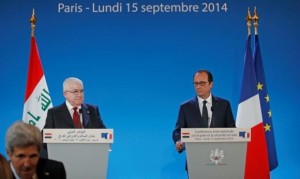Anti-ISIL coalition must look to Cairo, not London
The international coalition that’s battling to “degrade and destroy” ISIL meets in London today, but it is from Cairo that it should draw its spirit. More particularly, from the then newly elected US president Obama’s “a new beginning” speech in Cairo in June 2009, when he had the audacity of hope and the courage to tell the truth.
He memorably said that the situation in the Palestinian territories was “occupation”, that Muslims sometimes have cause to view the US and the larger western world as hostile to Islam, and that the United States has not always lived up to its ideals.
Six years on, that list remains intact and unaddressed, a message in a bottle condemned to forlornly bob around on the roiling waters of an increasingly irritable, inchoate and inconclusive debate about the rights and wrongs of satire and nuance. This is what Oxford professor Tariq Ramadan calls the perception that ever more insults are heaped on an already “stigmatised” Muslim community.
Meanwhile, angry crowds in disparate places – Niamey and Zinder in Muslim-majority Niger, the Chechen capital Grozny and Karachi in Pakistan – have been protesting against the French magazine Charlie Hebdo’s Prophet Mohammed cover. And ISIL continues to collect the rubbish in the areas it controls, as well as issue outrageous ransom videos threatening to behead two Japanese hostages. Boko Haram, which wants to establish a religious state in Nigeria, boldly takes control of ever larger swathes of its north-east, and Europe struggles to come up with a lifestyle formula that covers its six per cent Muslim population and allows for differences without divisions.
None of this is on the table at today’s anti-ISIL conference. Led by US secretary of state John Kerry and British foreign secretary Philip Hammond, 19 foreign ministers, including from the Arab states and three high-ranking officials (from the UN and the European Union and president Obama’s special envoy for the fight against ISIL) will address nuts-and-bolts issues. Discussions will focus on five areas: foreign fighters, the military campaign against ISIL targets, its sources of finances, strategic communications and humanitarian assistance.
But ISIL, Al Qaeda or the Kouachi brothers in France, the question to ask is the same: how do you confront something that appears to connect the local grievances of Muslim teenagers living in, say, Clichy sous-Bois on the outskirts of Paris, with mass indignation at a magazine cartoon, and the sense of injustice felt by Muslims all over the world at the occupation of Palestine?
Some years ago, Abu Musab Al Suri, a prominent Syrian jihadist ideologue, said that “Al Qaeda is not an organisation, it is a methodology”. ISIL is a methodology too, albeit with a geographically bounded goal and a worldwide recruitment policy that uses shared Muslim perceptions of stigmatisation and injustice to rally people to its fight. But while cartoon insults can incite for a day, a week or a month, it is the suffering of the Palestinians and America’s callous refusal to bind their wounds that serves as the cause célèbre for extremist movements throughout the Muslim world. American diplomats constantly admit this, in private and in more nuanced tones in public.
“Why do young people in Algeria, unemployed and living in poverty, tell me that their primary grievance in life is the fact that the Palestinians do not have a state? What makes 10,000 Indonesians march against violence in Gaza, but not Indonesian casualties at the hands of Jamaa Islamiyya or Al Qaeda?” asked Jared Cohen, a senior adviser to two US secretaries of state, Condoleezza Rice and Hillary Clinton.
Mr Cohen, whose job description at the state department focused on counter-terrorism and counter-radicalisation, was one of the architects of the US’s so-called 21st century statecraft policy. Bewildered, he goes on: “In Pakistan, thousands will amass in front of the US consulate in Karachi with bricks and slogans against violence between Israel and Hamas, but not the almost weekly Al Qaeda assaults inside their own borders. Why are Bangladeshi and Pakistani immigrants living in the UK angrier about the Arab-Israeli conflict than events in their home countries or the integration and inclusion challenges that more directly affect them?” He concluded that freelance extremist groups “play the role of flame-thrower, agitator, and mobiliser on what they view as a winning issue”. And this is always the Palestinians.
This is not just the CNN effect, the consequences of a globally amplified storyline. It is appropriate to recognise that Muslim states and peoples identify with one another in a way that non-Muslims do not. As has often been pointed out, there are no summit meetings of Protestant states, nor is there a Buddhist bloc in the United Nations. But 57 Muslim countries have the Organisation of the Islamic Conference; a scurrilous cartoon about the Prophet can spark a frenzy almost anywhere, and a violent, vaguely Salafist group in west Africa can set the same parallel course as ISIL – to establish a religious state – in a fusing of local and global themes.
Consequently, the London conference can interminably discuss ways to deal with ISIL and the US can endlessly call on the coalition to do more to combat extremism at home and abroad, but the Cairo moment of truth remains valid – and discredited because it has not been acted upon. As long as the hypocrisy on Palestine persists, any US-led messaging and conference is easily discounted.


